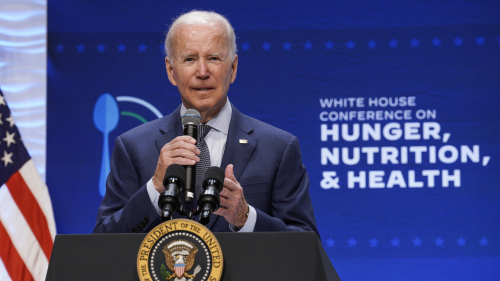White House Conference, Beefing Up, and Feeding the Taliban
Check out our roundup of the week's top news and research in food, agriculture, and global development.

Top Story
White House Conference
On Wednesday, President Biden spoke at the historic White House Conference on Hunger, Nutrition, and Health, bringing attention to food insecurity and hunger across the United States. Biden called upon Congress to permanently extend the child tax credit, raise minimum wage, expand nutrition assistance programs, and more, but any changes could take months to years to implement, leaving people wondering if Biden’s goal to end hunger by 2030 is possible. To learn more about the Conference, visit the Chicago Council on Global Affairs’ White House Conference page for policy recommendations, insights from listening sessions, and blogs addressing food insecurity.
Council Insights
Black Farmers’ Voices
“One of the most profound failings, which accounts for the persistence of food insecurity in this wealthiest of all…is the dramatic decrease in the number of Black farmers over the past century,” writes Senior Fellow Roger Thurow in Global Food for Thought. Read the full blog post to learn more about how discrimination and the diminishing number of Black farmers leads to food insecurity in America.
Food & Agriculture
Feeding the Taliban
The Taliban signed a provisional deal with Russia to import wheat and gas to Afghanistan at a discounted price. As the first major international economic deal struck by the Taliban since they returned to power, it will help ease Afghanistan’s isolation and could bring some stability to the country’s economy. However, the deal raises international concerns of alignment between Russia and Afghanistan, and could intensify global tensions.
Crisis in Haiti
Recent protests, looting, and an ongoing siege of a fuel terminal have thrust Haiti into a humanitarian catastrophe. Prior to the unrest, 4.9 million Haitians were already in a state of humanitarian need, including being food insecure, which is now steadily increasing. After attacks on WFP resulted in the loss of two thousand tonnes of food aid, hope that civilians will receive the help they need is dwindling.
Endangered Rice
Typhoon Noru devastated the Philippines’ farmland, exacerbating its already weakened food supply and high inflation rates. The farm losses amount to an estimated $21.9 million, affecting more than 141,000 hectares of agricultural land and impacting 82,000 farmers and fisherfolk in the country. Rice accounted for nearly 90 percent of the total losses, and the government predicts the typhoon affected 76 percent of the nation’s standing rice crops.
Deeper Dive
What Does Afghanistan Look Like Today?
Over a year after the Taliban took control of Afghanistan, the country is facing a quickly declining economy and overwhelming humanitarian needs. International organizations and countries around the globe are still condemning and isolating the Afghan government for its gross violations against women, religious minorities, and journalists, which has adverse effects on its struggling population. To learn more about its current state, visit our page on Afghanistan.
Data Crunch
Going Organic
A new study found that greenhouse gas emissions are 24 percent lower on organic dairy farms when compared to conventional dairy farms. Researchers point to increased grazing used in organic farming, a process that sequesters greater amounts of carbon, to explain the reduced emissions. They predict that methods such as organic farming can be part of the solution to start mitigating the effects of dairy farming.
Resilience
Stone Storage
A two decade-long megadrought in North America is forcing some communities to change their approach to water storage. An emerging technique called aquifer recharge relies on porous underground rock formations to store water, allowing cities to build water reserves. The technique is becoming a go-to way for cities to ensure they have sufficient water supplies during droughts, and could improve irrigation for farms.
Big Ideas
Beefing Up
A California-based food tech company is working on the launch of its first product: a burger that combines plant-based ingredients with cultured beef cells. The company hopes to use its cell-based beef products to decrease the beef industry’s carbon footprint and improve public health. This month, they will begin piloting the prototype of the plant-based portion of their burgers.
DC Report
Let’s Get the Bill
Pushes to restore degrading soil and bolster food security are gaining traction, and could affect next year’s farm bill. The farm bill will dictate agricultural policy through at least 2028, making it vital to protecting farmers’ interests. Advocating for regenerative farming in the bill will prevent long-term food shortages, and could bring profitability back to struggling farms.
Big Actors
Rotten Apples
India initiated repairs along the Srinagar-Jammu highway, which connects Kashmir and India, causing extensive delays and sparking protests from farmers. At a standstill on the highway, farmers’ trucks filled with produce—especially apples—are starting to rot without the proper storage or access to the market. Losing an estimated $12.25 million, farmers are facing extensive setbacks that could wreak long-term damage on their financial stability.
Trade & Commodities
Pleas for Export Aid
In a statement to the European Commission, Ukraine's agriculture minister Mykola Solsky urged the EU to make the emergency paths for grain permanent. Solsky also requested financial support to reduce its reliance on Black Sea exports that Russia could easily disrupt. This support would include investment in at least five border terminals, a pipeline for sunflower harvests, and an increase in its fleet of trucks that would improve cereals transportation across borders.
Council Events
Did you miss one of our previous livestreams? Don't worry! They are all available on our website to watch at any time.
Other Upcoming Events
Agricultural R&D’s Role in Addressing Global Food Security
Date: October 3
Time: 11:00 a.m. – 12:00 p.m. CT
Feeding a Fragile World: World Food Prize Foundation Norman E. Borlaug International Dialogue
Date: October 12 - 21
Farm Commons Webinar for Illinois Farmers: Business Structure Basics
Date: October 24
Time: 6:00 – 7:00 p.m. CT
Sharm El-Sheikh Climate Change Conference (COP27)
Date: November 6 - 18
Land Acknowledgement Statement
The Center on Global Food and Agriculture recognizes it occupies the ancestral land of the Kiikaapoi, Peoria, Kaskaskia, Bodwéwadmi, and Myaamia people. Indigenous communities around the world disproportionately experience the pressures of climate change, global conflicts, and the COVID-19 pandemic, while simultaneously stewarding 80 percent of the world’s biodiversity. These Indigenous tribes and nations are the original owners of this land and continue to be systemically erased by policies and practices that ignore their histories. To learn more about Indigenous foodways and practices, check out our 2022 blog series "Stewardship, Sovereignty, and Solutions."
Related Content
- Embracing Dandelions as Food and Medicine
- Going Beyond Regenerative Agriculture on Tribal Lands
- Expanding "638" to Enhance Native American Food Sovereignty
- Flavors and Culture: Food Systems Through Indigenous Women's Eyes
- A Thanksgiving Legacy: Fighting for Indigenous Food Sovereignty
- Native Food Sovereignty: Strengthening Connection to Culture
- Reconnecting to Indigenous Food Sovereignty Values and Practices
- Embracing Interconnectedness: How Indigenous Foodways Can Save Us

